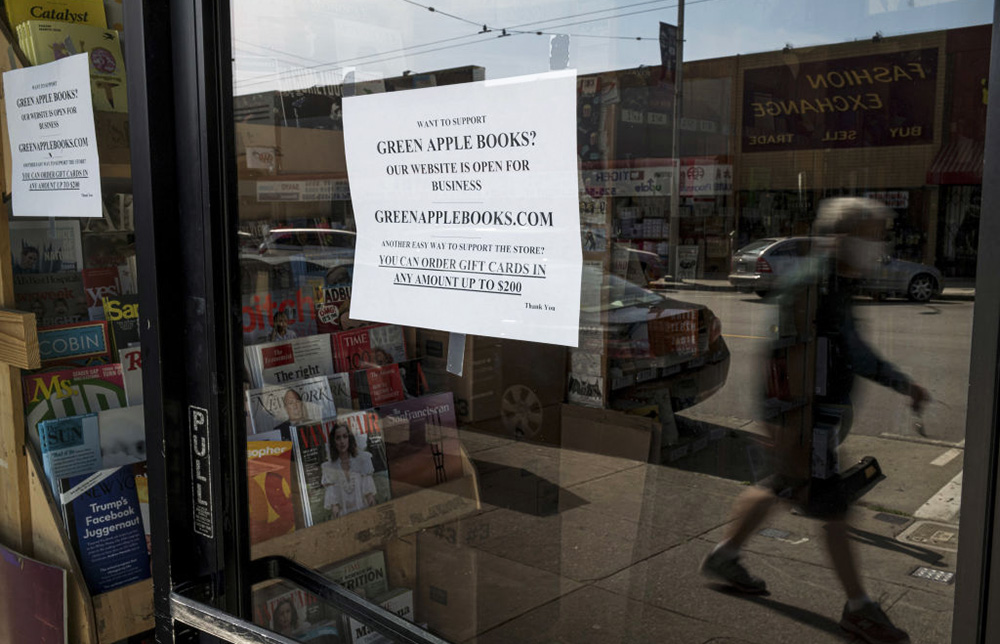美國郵政總局(United States Postal Service,USPS)是少數幾個總能獲得民主黨和共和黨兩黨支持的政府部門之一。這是因為郵政總局是一個獨立的行政部門,它所提供的服務會影響到每一個美國人、每一棟住宅和每一家企業。在郵政總局遭遇危機期間,獨立書店成為高風險行業之一。
多年來,獨立書店一直處在岌岌可危的狀態,面臨著新興的大型書店的競爭(并且通常處在下風),但這些大型書店在亞馬遜(Amazon)橫空出世之后都已經消失不見。然而在地方社區的支持下,許多獨立書店堅持了下來,并且出現了一些服務邊緣和弱勢社區的獨立書店。事實上,據Statista統計,過去幾年美國的獨立書店數量呈增長趨勢,截至2019年年底,共有1,887家獨立書商經營著2,524家書店。
后來發生了新冠疫情,隨之而來的停工對絕大多數零售企業造成了毀滅性打擊。雖然美國部分書店已經復工,甚至某些地區的書店一次允許多位顧客進入,但很多書店嚴重依賴通過路邊自提和郵寄方式履行的在線訂單。但特朗普支持的郵政總局局長路易斯?德喬伊在7月24日公布一項計劃,即減慢郵寄速度以節約成本(沒有透露具體能節約多少成本)。無論是即將開始的大選,還是在疫情期間經營已經舉步維艱的企業的生存,都會因為該計劃遭遇災難性的打擊。

Reparations Club的創始人杰茲?麥克吉爾伯特說:“我們依靠郵政服務滿足新老客戶的需求,這既是優勢也是挑戰。”Reparations Club是位于洛杉磯的一家書店,也是一家概念店和社區空間。
在疫情爆發之前,Reparations Club主打實體零售體驗。麥克吉爾伯特解釋說:“在疫情之前,我們致力于與洛杉磯市中心和南部的本地社區建立關系。我們主要依靠顧客的口口相傳。我們沒有網店,因此郵寄訂單很少。”
但在疫情爆發之后的幾個月里,洛杉磯成為疫情中心,許多商戶依舊關閉,實體店一直停業,因此Reparations Club從2019年開業以來首次轉向了在線業務。麥克吉爾伯特說,新冠疫情和今年夏天支持“珍視黑人生命”的抗議示威活動,徹底顛覆了該書店的業務;現在書店99%的訂單通過USPS郵寄。麥克吉爾伯特表示,書店每天都會給顧客寄書,有時候會派專人配送本地訂單,甚至會邀請常客直接到她家中取書。
但7月底執行的郵政服務改革很快讓書商遭遇重創。麥克吉爾伯特說,她的書店遭遇了多次包裹配送延誤和丟失,結果造成了嚴重的客戶服務問題。麥克吉爾伯特充分利用當前的情況,與本地郵局的員工交朋友,并根據他們的建議進行調整。

她說:“我們調整了工作流程和預期。盡管如此,我們還是明顯感覺到,許多新客戶首次從黑人所有的書店買書。對我們來說,給客戶留下最好的第一印象始終非常重要,但由于快遞延誤,我們很難做到這一點。很可惜,黑人的公司要承擔很多不合理的負擔。但總體上過來說,我們的客戶都很理智,他們清楚我們不是亞馬遜這樣的公司,他們知道會發生什么。客戶非常理解我們為什么選擇繼續通過USPS寄書,而不使用私營快遞公司。”
媒體郵件郵遞
書店使用USPS的另外一個好處是,書店還可以選擇一類特殊的郵件進行郵寄,這對于書商和顧客而言都很劃算。媒體郵件的基礎運費為2.80美元,用于郵寄圖書、出版的音樂資料、手稿、DVD、CD等媒體和教育資料非常劃算。
舊金山青蘋果書店(Green Apple Books)的老板之一彼得?馬爾維希爾說:“USPS對書店的運營至關重要,無論是從供應商采購圖書,還是以優惠的價格向全國各地的顧客郵寄圖書,都離不開USPS。甚至有些地方只能接收USPS郵件,比如監獄等。”
馬爾維希爾是美國書商協會(American Booksellers Association)的委員會成員。他說從3月16日有知名獨立書店關閉以來,整個行業的形勢如同坐過山車一般。幾個月來,所有圖書銷售業務都轉到了線上。但馬爾維希爾說,在3月和4月,青蘋果書店得到了源源不斷的支持,而且書店幾乎只通過USPS的媒體郵件(有時采用優先郵件)履行訂單。馬爾維希爾表示:“有些本地訂單我們會親自配送,但看著一個包裹被送到幾英里外的城市另一端,轉到洛杉磯幾天之后再送回到本地,這讓人很難接受。但我們的顧客很有耐心。”
5月中旬,青蘋果書店復工,開始提供路邊自提業務,但公司大部分銷售都是來自在線訂單或手機訂單,依舊需要郵寄,并且幾乎全部訂單都通過USPS媒體郵件發出。青蘋果書店每天營業11個小時,并且已經允許顧客在書店看書,但書店仍然有約20%的銷售額來自線上訂單(疫情之前只有1%)。馬爾維希爾說:“我們與亞馬遜不同。我們無法在連續幾十年虧損的同時擴大市場份額。我們也養不起自己的飛機、卡車和承包商,所以USPS非常重要。”
他解釋說:“在3月和4月,整個USPS系統的郵寄速度明顯放緩,原因是顯而易見的。通過這些原因,我們應該明白USPS對于生活必需品郵寄的重要性。后來情況有所好轉,但如今郵寄速度再次變慢。即便是優先郵件有時候也需要一周的時間才能送達。以往優先郵件只需要兩三天時間就可以準時送達任何地方。這讓我們的客戶非常不滿,增加了員工的工作量,而且這無疑會讓我們損失許多訂單。因為人們更愿意從只要兩天就能送達的亞馬遜上購物,不想等上一周來支持我們。”

杰夫?梅耶森與妻子琳達?西蒙森在馬薩諸塞州劍橋共同經營一家哈佛書店(Harvard Book Store)。該書店通過USPS履行的訂單在其業務中所占的比例,已經超過了疫情之前。最近,該書店主要依靠線上銷售和大量采購業務才得以維持經營。
梅耶森說:“如果顧客不相信我們能準時送達圖書,我們擔心他們會選擇其他途徑買書。書店的總體業務量大幅減少,這讓我們難以承受更多收入損失。”
自疫情爆發以來,書店的業務量明顯下滑。在4月和5月,書店唯一的收入來自其通過與本地書商網站整合的第三方服務Bookshop.org履行的訂單。6月初,哈佛書店開始履行自己的網絡訂單。約一半網絡訂單通過USPS完成,另外一半采取了路邊自提的方式。積極的一面是,過去幾個月,哈佛書店的網上銷售額增長了500%至700%。7月,哈佛書店重新對顧客開放,但限制了人數,并縮短了營業時間。
梅耶森解釋說:“雪上加霜的是,我們使用USPS的媒體郵件服務作為一種劃算的圖書郵寄方式。媒體郵件的優先級低于普通郵件或優先郵件。因此,我們預測整個郵政服務系統中斷將對媒體郵件服務產生特別嚴重的影響。如果我們不得不選擇一種替代USPS媒體郵件的服務,我們的郵寄成本會飆升到客戶難以接受的程度。因此,郵政服務中斷會減少我們的收入,同時增加成本,這兩方面的影響會給我們帶來災難性的后果。”

但在8月19日星期二,形勢急轉直下。郵政總局局長德喬伊改變了態度,宣布暫停削減郵政服務,直到11月3日美國總統大選結束為止,他宣稱此舉的目的是防止影響郵寄選票。但他沒有具體說明是否要推翻已經執行的對郵政服務的改革措施,包括拆除各地的郵件分揀機和郵箱等。這些改革措施依舊會阻礙郵寄速度,包括媒體郵件的郵寄,因為許多圖書和光盤類包裹通常很薄,很容易塞到郵箱里,而且可以在家或在公司打印郵票。
馬爾維希爾說:“如果說[本周]有哪些令人安心的好消息,那就是特朗普政府破壞USPS系統的計劃已經失敗。但USPS仍然需要支持,尤其是郵寄選票作為一種重要的選舉方式,將有大量選票要通過USPS郵寄。”
梅耶森認為,現在判斷USPS危機對其書店業務的影響仍然為時尚早。他解釋說:“我們一直覺得USPS的服務非常可靠,所以我們以前不需要跟蹤郵寄速度。這導致我們沒有進行比較的可靠基礎。我們開始聽說郵件延誤的報告,但這些信息現在還只是道聽途說而已。我們將開始跟蹤郵件送達時間,監控具體情況。出于上文所述的原因,我們認為如果郵政服務中斷,將威脅書店的生存。”(財富中文網)
譯者:Biz
美國郵政總局(United States Postal Service,USPS)是少數幾個總能獲得民主黨和共和黨兩黨支持的政府部門之一。這是因為郵政總局是一個獨立的行政部門,它所提供的服務會影響到每一個美國人、每一棟住宅和每一家企業。在郵政總局遭遇危機期間,獨立書店成為高風險行業之一。
多年來,獨立書店一直處在岌岌可危的狀態,面臨著新興的大型書店的競爭(并且通常處在下風),但這些大型書店在亞馬遜(Amazon)橫空出世之后都已經消失不見。然而在地方社區的支持下,許多獨立書店堅持了下來,并且出現了一些服務邊緣和弱勢社區的獨立書店。事實上,據Statista統計,過去幾年美國的獨立書店數量呈增長趨勢,截至2019年年底,共有1,887家獨立書商經營著2,524家書店。
后來發生了新冠疫情,隨之而來的停工對絕大多數零售企業造成了毀滅性打擊。雖然美國部分書店已經復工,甚至某些地區的書店一次允許多位顧客進入,但很多書店嚴重依賴通過路邊自提和郵寄方式履行的在線訂單。但特朗普支持的郵政總局局長路易斯?德喬伊在7月24日公布一項計劃,即減慢郵寄速度以節約成本(沒有透露具體能節約多少成本)。無論是即將開始的大選,還是在疫情期間經營已經舉步維艱的企業的生存,都會因為該計劃遭遇災難性的打擊。
Reparations Club的創始人杰茲?麥克吉爾伯特說:“我們依靠郵政服務滿足新老客戶的需求,這既是優勢也是挑戰。”Reparations Club是位于洛杉磯的一家書店,也是一家概念店和社區空間。
在疫情爆發之前,Reparations Club主打實體零售體驗。麥克吉爾伯特解釋說:“在疫情之前,我們致力于與洛杉磯市中心和南部的本地社區建立關系。我們主要依靠顧客的口口相傳。我們沒有網店,因此郵寄訂單很少。”
但在疫情爆發之后的幾個月里,洛杉磯成為疫情中心,許多商戶依舊關閉,實體店一直停業,因此Reparations Club從2019年開業以來首次轉向了在線業務。麥克吉爾伯特說,新冠疫情和今年夏天支持“珍視黑人生命”的抗議示威活動,徹底顛覆了該書店的業務;現在書店99%的訂單通過USPS郵寄。麥克吉爾伯特表示,書店每天都會給顧客寄書,有時候會派專人配送本地訂單,甚至會邀請常客直接到她家中取書。
但7月底執行的郵政服務改革很快讓書商遭遇重創。麥克吉爾伯特說,她的書店遭遇了多次包裹配送延誤和丟失,結果造成了嚴重的客戶服務問題。麥克吉爾伯特充分利用當前的情況,與本地郵局的員工交朋友,并根據他們的建議進行調整。
她說:“我們調整了工作流程和預期。盡管如此,我們還是明顯感覺到,許多新客戶首次從黑人所有的書店買書。對我們來說,給客戶留下最好的第一印象始終非常重要,但由于快遞延誤,我們很難做到這一點。很可惜,黑人的公司要承擔很多不合理的負擔。但總體上過來說,我們的客戶都很理智,他們清楚我們不是亞馬遜這樣的公司,他們知道會發生什么。客戶非常理解我們為什么選擇繼續通過USPS寄書,而不使用私營快遞公司。”
媒體郵件郵遞
書店使用USPS的另外一個好處是,書店還可以選擇一類特殊的郵件進行郵寄,這對于書商和顧客而言都很劃算。媒體郵件的基礎運費為2.80美元,用于郵寄圖書、出版的音樂資料、手稿、DVD、CD等媒體和教育資料非常劃算。
舊金山青蘋果書店(Green Apple Books)的老板之一彼得?馬爾維希爾說:“USPS對書店的運營至關重要,無論是從供應商采購圖書,還是以優惠的價格向全國各地的顧客郵寄圖書,都離不開USPS。甚至有些地方只能接收USPS郵件,比如監獄等。”
馬爾維希爾是美國書商協會(American Booksellers Association)的委員會成員。他說從3月16日有知名獨立書店關閉以來,整個行業的形勢如同坐過山車一般。幾個月來,所有圖書銷售業務都轉到了線上。但馬爾維希爾說,在3月和4月,青蘋果書店得到了源源不斷的支持,而且書店幾乎只通過USPS的媒體郵件(有時采用優先郵件)履行訂單。馬爾維希爾表示:“有些本地訂單我們會親自配送,但看著一個包裹被送到幾英里外的城市另一端,轉到洛杉磯幾天之后再送回到本地,這讓人很難接受。但我們的顧客很有耐心。”
5月中旬,青蘋果書店復工,開始提供路邊自提業務,但公司大部分銷售都是來自在線訂單或手機訂單,依舊需要郵寄,并且幾乎全部訂單都通過USPS媒體郵件發出。青蘋果書店每天營業11個小時,并且已經允許顧客在書店看書,但書店仍然有約20%的銷售額來自線上訂單(疫情之前只有1%)。馬爾維希爾說:“我們與亞馬遜不同。我們無法在連續幾十年虧損的同時擴大市場份額。我們也養不起自己的飛機、卡車和承包商,所以USPS非常重要。”
他解釋說:“在3月和4月,整個USPS系統的郵寄速度明顯放緩,原因是顯而易見的。通過這些原因,我們應該明白USPS對于生活必需品郵寄的重要性。后來情況有所好轉,但如今郵寄速度再次變慢。即便是優先郵件有時候也需要一周的時間才能送達。以往優先郵件只需要兩三天時間就可以準時送達任何地方。這讓我們的客戶非常不滿,增加了員工的工作量,而且這無疑會讓我們損失許多訂單。因為人們更愿意從只要兩天就能送達的亞馬遜上購物,不想等上一周來支持我們。”
杰夫?梅耶森與妻子琳達?西蒙森在馬薩諸塞州劍橋共同經營一家哈佛書店(Harvard Book Store)。該書店通過USPS履行的訂單在其業務中所占的比例,已經超過了疫情之前。最近,該書店主要依靠線上銷售和大量采購業務才得以維持經營。
梅耶森說:“如果顧客不相信我們能準時送達圖書,我們擔心他們會選擇其他途徑買書。書店的總體業務量大幅減少,這讓我們難以承受更多收入損失。”
自疫情爆發以來,書店的業務量明顯下滑。在4月和5月,書店唯一的收入來自其通過與本地書商網站整合的第三方服務Bookshop.org履行的訂單。6月初,哈佛書店開始履行自己的網絡訂單。約一半網絡訂單通過USPS完成,另外一半采取了路邊自提的方式。積極的一面是,過去幾個月,哈佛書店的網上銷售額增長了500%至700%。7月,哈佛書店重新對顧客開放,但限制了人數,并縮短了營業時間。
梅耶森解釋說:“雪上加霜的是,我們使用USPS的媒體郵件服務作為一種劃算的圖書郵寄方式。媒體郵件的優先級低于普通郵件或優先郵件。因此,我們預測整個郵政服務系統中斷將對媒體郵件服務產生特別嚴重的影響。如果我們不得不選擇一種替代USPS媒體郵件的服務,我們的郵寄成本會飆升到客戶難以接受的程度。因此,郵政服務中斷會減少我們的收入,同時增加成本,這兩方面的影響會給我們帶來災難性的后果。”
但在8月19日星期二,形勢急轉直下。郵政總局局長德喬伊改變了態度,宣布暫停削減郵政服務,直到11月3日美國總統大選結束為止,他宣稱此舉的目的是防止影響郵寄選票。但他沒有具體說明是否要推翻已經執行的對郵政服務的改革措施,包括拆除各地的郵件分揀機和郵箱等。這些改革措施依舊會阻礙郵寄速度,包括媒體郵件的郵寄,因為許多圖書和光盤類包裹通常很薄,很容易塞到郵箱里,而且可以在家或在公司打印郵票。
馬爾維希爾說:“如果說[本周]有哪些令人安心的好消息,那就是特朗普政府破壞USPS系統的計劃已經失敗。但USPS仍然需要支持,尤其是郵寄選票作為一種重要的選舉方式,將有大量選票要通過USPS郵寄。”
梅耶森認為,現在判斷USPS危機對其書店業務的影響仍然為時尚早。他解釋說:“我們一直覺得USPS的服務非常可靠,所以我們以前不需要跟蹤郵寄速度。這導致我們沒有進行比較的可靠基礎。我們開始聽說郵件延誤的報告,但這些信息現在還只是道聽途說而已。我們將開始跟蹤郵件送達時間,監控具體情況。出于上文所述的原因,我們認為如果郵政服務中斷,將威脅書店的生存。”(財富中文網)
譯者:Biz
The United States Postal Service is one of the few agencies that almost always receives bipartisan support among Democrats and Republicans. That’s because the independent agency of the executive branch is a service that touches every person in the country, every residence, and every business. And among the businesses at risk during the crisis happening at the USPS are independent bookstores.
Indie bookstores had already been hanging on by a thread for years, facing off (and often losing) against the emergence of big-box bookstores, which in turn have all but perished in the wake of Amazon. Nevertheless, with the support of local communities, many indie bookstores have held on, and others have emerged to cater to marginalized and underserved communities. The number of independent bookstores in the U.S. had actually been on the rise in the past few years, with 1,887 independent bookselling companies running 2,524 stores by the end of 2019, according to Statista.
Then came the COVID-19 pandemic, and the ensuing economic shutdowns have been nothing but devastating for the vast majority of retailers. Although some bookstores around the country have been able to reopen, even to the point of allowing a few customers inside at a time in select areas, many of them are relying heavily on online requests with curbside pickup and delivery by mail to fulfill orders. But when Trump-backed postmaster general Louis DeJoy announced plans on July 24 that would slow mail delivery but save costs (without any further specifics as to how much), catastrophe loomed on all fronts, from the upcoming election to the survival of businesses already struggling to stay open through the pandemic.
“We’re leaning on the Postal Service pretty hard to reach our old and new customers, and it’s been both a blessing and a challenge,” says Jazzi McGilbert, founder of Reparations Club, a bookstore, community space, and concept shop in Los Angeles.
Pre-pandemic, Reparations Club was very much a physical retail experience. “Before the pandemic, we were focused on building relationships with our local community here in Mid-City and South L.A.,” McGilbert explains. “Things were so word-of-mouth—we hadn’t launched an online shop—that shipping requests were rare.”
But in the months since, as Los Angeles has become a hotspot for the virus, and many businesses remain shuttered, the brick-and-mortar shop has been closed, and Reparations Club transitioned its business online for the first time since opening in 2019. The simultaneous events of the pandemic and the social demonstrations supporting Black Lives Matter this summer completely shifted the business, McGilbert says; now 99% of the store’s orders are delivered via USPS. The bookstore is shipping books daily, sometimes hand-delivering locally, and even inviting some regular customers to pick up books from her home directly, McGilbert notes.
But the Postal Service changes implemented at the end of July hit booksellers hard and fast. McGilbert says her store experienced many delays and lost packages, which in turn led to major customer service headaches. McGilbert made the best of the situation, making friends with the crew at her local post office and making adjustments according to their advice.
“We’ve adjusted our workflow and expectations. That said, we’re hyperaware that many of our new customers are buying from Black-owned bookstores for the very first time. It’s important to us that we put our best foot forward always, and that’s been hard to reconcile with the shipping delays. Unfortunately, Black businesses carry a lot of undue burdens,” McGilbert says. “But by and large, our customers are pretty conscious shoppers—they know we’re not Amazon, and they know what’s up. Those customers have been overwhelmingly understanding of our explanations why we’ll continue to ship via USPS over private carriers.”
Media Mail delivery
Bookstores also benefit thanks to a special classification of mail that is more cost-effective for both booksellers and customers. With pricing starting at $2.80, Media Mail is a cost-effective way to send media and educational materials, such as books, printed music, manuscripts, DVDs, CDs, and more.
“The USPS is vital to our operations, from receiving books from our suppliers to being able to affordably mail orders to customers all over the country. There are even places, like prisons, that can only receive books via USPS,” says Pete Mulvihill, co-owner of San Francisco’s Green Apple Books.
Mulvihill, also a board member of the American Booksellers Association, says it’s been a roller coaster since the famous indie bookstore first closed on March 16. All sales moved online for several months. But Mulvihill says Green Apple saw a huge outpouring of support in March and April, and the store fulfilled orders almost exclusively via USPS Media Mail (and sometimes Priority Mail). "We did a little bit of local delivery ourselves, but it was hard to watch a package going a few miles across town go to Los Angeles for a few days before coming back. But our customers were patient," Mulvihill says.
In mid-May, Green Apple Books reopened for curbside pickup, but a majority of the company's sales were still mailed out, either from online or phone orders, almost all via USPS Media Mail. Even with browsing available and doors open 11 hours each day, approximately 20% of its sales are online (up from 1% pre-COVID). “Unlike Amazon, we can’t lose money for decades while growing market share, nor can we afford our own fleet of planes and vans and contractors, so USPS is crucial,” Mulvihill says.
“Shipments slowed down quite a bit throughout the USPS system in March and April for obvious reasons. Those obvious reasons should illustrate how important USPS’s role is in delivering essential goods. Things got better for a bit, then slowed again recently,” Mulvihill explains. “Even Priority Mail—which used to reliably get anywhere within two to three days—was sometimes taking a week. That frustrated our customers, led to more staff work, and doubtlessly cost us orders from folks who would rather get something from Amazon in two days than wait a week to support us.”
Orders fulfilled via USPS constitute a much larger percentage of the business than was the case prior to the pandemic for Jeff Mayersohn, who co-owns the Harvard Book Store in Cambridge, Mass., with his wife, Linda Seamonson. Lately their business has survived primarily on web-based sales and bulk purchases.
“If customers cannot count on us to deliver books in a timely fashion, we fear that they will seek alternatives,” says Mayersohn. “Since total business is down significantly, we cannot afford to lose additional revenue.”
Since the pandemic started, business has been down significantly. In April and May, the only revenue coming in was through Bookshop.org, a third-party service integrated with local bookseller websites for order fulfillments. In early June, the Harvard Book Store was able to start fulfilling its own web orders. Approximately half of the web-based orders are fulfilled through USPS and half via curbside pickup. On the positive side, web sales for the Harvard Book Store have been up between 500% and 700% over the past few months. In July, the Harvard Book Store reopened to walk-in customers with a limited capacity and reduced hours.
“Compounding the problem is that we use USPS’s Media Mail service as a cost-effective method for shipping books. Media Mail receives lower priority handling than First-Class or Priority Mail. We, therefore, would expect Media Mail to be disproportionately affected by disruptions in overall mail service,” Mayersohn explains. “If we had to seek an alternative to USPS Media Mail, our shipping costs would balloon to unacceptable levels. Thus, any disruptions to mail service would have the combined affect of reducing revenue and increasing costs, the combination of which would be catastrophic.”
But on Tuesday, Aug. 19 came a sudden reversal, with DeJoy doubling back and suspending the cutbacks to the Postal Service until after the presidential election on Nov. 3 with the expressed intent to avoid the appearance of any impact on election mail. But it was not specified as to whether or not the postmaster general would roll back any of the changes already made to the Postal Service, including the removal of many sorting machines and mailboxes around the country. Those changes still stand to slow down the mail, including the delivery of Media Mail, as many packages of books and disc-based content are typically slim enough to be slipped into mailboxes quite easily with postage printed at home or at work.
“If [this week’s] news is any reassurance, perhaps the Trump administration’s apparent efforts to cripple the USPS have failed. But it still needs support, especially as a crucial election approaches with lots of ballots flowing through USPS,” Mulvihill says.
Mayersohn suggests it might be too soon to judge the effect of the USPS crisis on his own business. “The USPS has been such a reliable service for us that we’ve never had to track speed of delivery in the past,” he explains. “As a result, we don’t have a reliable basis for comparison. We are beginning to hear reports of delays, but this information is anecdotal right now. We will begin to track delivery times to monitor the situation. For the reasons stated above, we view the possibility of disruptions in mail service as an existential threat.”






